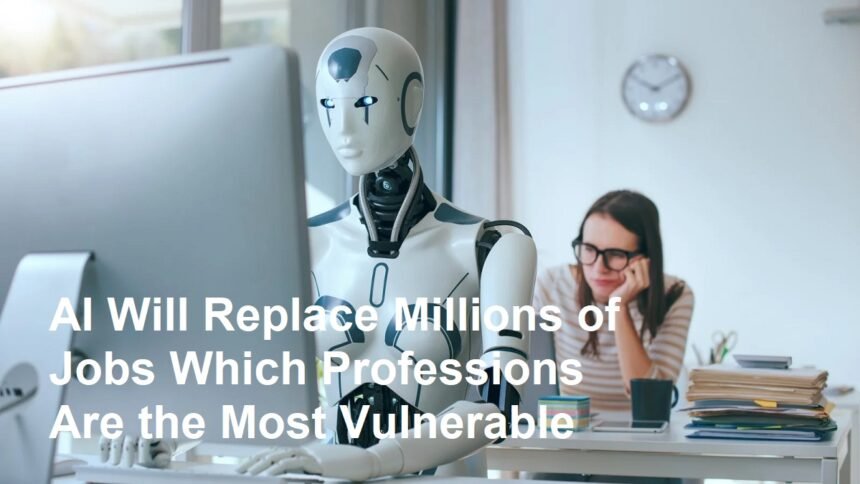Introduction
Artificial Intelligence (AI) is no longer a futuristic idea—it’s here, and it’s transforming the way we work. From chatbots answering customer service queries to algorithms writing reports, the shift is happening faster than many expected. While AI brings efficiency and innovation, it also raises concerns about job security.
This article dives into AI will replace millions of jobs: which professions are the most vulnerable?, explains why AI can replace human labor, and highlights the impact of advanced AI on the global job market. Most importantly, we’ll also explore how you can adapt and stay relevant in this new era.
Why AI Can Replace Human Jobs
AI excels at repetitive, predictable, and data-driven tasks. Unlike humans, AI doesn’t get tired, doesn’t take breaks, and can process massive amounts of information instantly. Employers see it as cost-efficient and reliable, making some human roles less essential.
For example, tasks like data entry, routine analysis, or answering frequently asked questions can be fully automated. Over time, industries that rely heavily on routine work will see the biggest shift.
The Rise of Advanced AI and Its Global Impact
Perkembangan AI / kecerdasan buatan yang semakin canggih dan dampaknya pada pasar kerja global
AI is becoming more sophisticated every year. What started as simple automation has evolved into powerful tools capable of creative, analytical, and even decision-making functions. This rapid growth affects not just local industries but also the global job market.
- Efficiency: Companies can cut costs by replacing human labor with AI.
- Global competition: Workers now compete not only with people from other countries but also with machines.
- Job polarization: High-skill roles (like AI specialists) grow in demand, while mid-skill jobs shrink.
- Reskilling urgency: Workers need to adapt to stay employable in the AI-driven economy.
Professions Most Vulnerable to AI
1. Data Entry and Administrative Roles
Jobs that involve repetitive typing, record keeping, or simple documentation are highly at risk. AI tools can handle data input faster and with fewer errors.
Tip to adapt: Focus on developing analytical and problem-solving skills, which AI still struggles to replicate.
2. Customer Service Representatives
AI-powered chatbots and virtual assistants can now handle customer queries 24/7 at a fraction of the cost. While humans are still needed for complex issues, entry-level service jobs are shrinking.
Tip to adapt: Improve soft skills like empathy, negotiation, and emotional intelligence to stand out where AI falls short.
3. Retail and Cashier Jobs
With self-checkout machines and AI-driven online shopping platforms, many cashier and basic retail jobs are being phased out.
Tip to adapt: Transition into roles involving customer experience, product curation, or e-commerce strategy.
4. Basic Accounting and Bookkeeping
AI software can already generate invoices, track expenses, and handle taxes for small businesses. Routine accounting tasks are no longer dependent on human labor.
Tip to adapt: Upskill in financial analysis, auditing, or advisory services where human judgment is still essential.
5. Transportation and Delivery
With self-driving cars, drones, and automated logistics, drivers and delivery workers face increasing risks. While full adoption is still years away, the trend is clear.
Tip to adapt: Explore opportunities in fleet management, AI system monitoring, or roles that oversee transportation technologies.
6. Manufacturing and Assembly Line Jobs
Robotics has long been used in factories, and with AI integration, machines can now perform even more complex tasks. This reduces reliance on human labor in mass production.
Tip to adapt: Focus on technical skills like operating, programming, or maintaining advanced machines.
Jobs Less Likely to Be Replaced
Not all professions are equally at risk. Jobs that require creativity, emotional intelligence, critical thinking, and human interaction remain safer. For example:
- Teachers and educators (though AI will assist, not replace).
- Healthcare professionals (nurses, therapists, doctors in complex cases).
- Creative industries (writers, designers, artists—though AI can support them).
- Strategic leadership roles (decision-making that considers ethics, culture, and nuance).
How Workers Can Prepare for the AI Future
- Embrace Lifelong Learning
Continuous upskilling is no longer optional. Online courses, certifications, and workshops can help you stay competitive.
- Develop Soft Skills
AI struggles with empathy, leadership, and complex human interaction. Strengthening these skills ensures you remain valuable.
- Explore Tech-Complementary Roles
Instead of fighting AI, learn how to work with it. Professions like AI management, machine learning support, and data analysis are in growing demand.
- Stay Flexible
The job market is evolving quickly. Adaptability and openness to career shifts will be key survival skills.
Conclusion
The reality is clear: AI will replace millions of jobs: which professions are the most vulnerable? Routine and repetitive roles are the first to go. But this doesn’t mean the future is bleak. With the right mindset and skills, workers can adapt, grow, and even thrive alongside AI.











